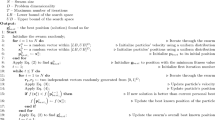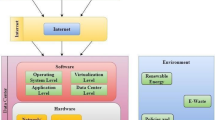Abstract
One of the most challenging aspects of cloud computing is task scheduling. User needs are changing rapidly in a dynamic environment, and the resources can fluctuate depending on demand because they are virtual. This study presents a hybrid task scheduling model that combines Particle Swarm Optimization and Whale Optimization techniques to address the challenges of task scheduling and achieve the best performance. The method is analyzed and scored based on its “makespan,” “resource utilization,” and “convergence.” Test results indicate that the proposed method reduces the makespan in all cases. Additionally, it increases resource utilization compared to the existing state-of-the-art methods. Furthermore, resource utilization increases across the board with the number of tasks performed.









Similar content being viewed by others
References
Panda, S. K., Nanda, S. S., & Bhoi, S. K. (2022). A pair-based task scheduling algorithm for cloud computing environment. Journal of King Saud University-Computer and Information Sciences, 34(1), 1434–1445. https://doi.org/10.1016/j.jksuci.2018.10.001
Rastogi, G, Sushil R (2015) Analytical literature survey on existing load balancing schemes in cloud computing. In: 2015 International Conference on Green Computing and Internet of Things (ICGCIoT). IEEE, pp 1506–1510. https://doi.org/10.1109/ICGCIoT.2015.7380705
Xue, S., Shi, W., & Xu, X. (2016). A heuristic scheduling algorithm based on PSO in the cloud computing environment. International Journal of u-and e-Service Science and Technology, 9, 349–362. https://doi.org/10.14257/ijunesst.2016.9.1.36
Rajakumari, K., Kumar, M. V., Verma, G., Balu, S., Sharma, D. K., & Sengan, S. (2022). Fuzzy based ant colony optimization scheduling in cloud computing. Computer Systems Science & Engineering. https://doi.org/10.32604/csse.2022.019175
Liu, Z., & Wang, X. (2012). A PSO-based algorithm for load balancing in virtual machines of cloud computing environment. In: Advances in Swarm Intelligence: Third International Conference, ICSI 2012, Shenzhen, China, June 17–20, 2012 Proceedings, Part I 3, pp 142–147. Springer Berlin Heidelberg. https://doi.org/10.1007/978-3-642-30976-2_17
Verma, G. (2022). Hybrid optimization model for secure task scheduling cloud combining optimization. Cybernetics and Systems 1-23
Kumar, M., & Sharma, S. C. (2020). Dynamic load balancing algorithm to minimize the makespan time and utilize the resources effectively in cloud environment. International Journal of Computers and Applications, 42(1), 108–117. https://doi.org/10.1080/1206212X.2017.1404823
Rastogi, G. & Sushil, R. (2015). Cloud computing security and homomorphic encryption. IUP Journal of Computer Sciences, 9(3), 48–58. https://papers.ssrn.com/sol3/papers.cfm?abstract_id=2693438
Jena, U. K., Das, P. K., & Kabat, M. R. (2022). Hybridization of meta-heuristic algorithm for load balancing in cloud computing environment. Journal of King Saud University-Computer and Information Sciences, 34(6), 2332–2342. https://doi.org/10.1016/j.jksuci.2020.01.012
Ebadifard, F., & Babamir, S. M. (2018). A PSO‐based task scheduling algorithm improved using a load‐balancing technique for the cloud computing environment. Concurrency and Computation: Practice and Experience, 30(12), e4368. https://onlinelibrary.wiley.com/doi/abs/https://doi.org/10.1002/cpe.4368
Verma, G. (2022). Secure VM migration in cloud: Multi-criteria perspective with improved optimization model. Wireless Personal Communications. https://doi.org/10.1007/s11277-021-09319-w
Kumar, M., & Sharma, S. C. (2018). Deadline constrained based dynamic load balancing algorithm with elasticity in cloud environment. Computers & Electrical Engineering, 69, 395–411. https://doi.org/10.1016/j.compeleceng.2017.11.018
Jacob Prem, T., & Pradeep, K. (2019). A multi-objective optimal task scheduling in cloud environment using cuckoo particle swarm optimization. Wireless Personal Communications, 109, 315–331. https://doi.org/10.1007/s11277-019-06566-w
Agarwal, M., & Srivastava, G. M. S. (2019). A PSO algorithm based task scheduling in cloud computing. International Journal of Applied Metaheuristic Computing (IJAMC), 10(4), 1–17. https://doi.org/10.4018/IJAMC.2019100101
Kennedy, J., & Eberhart, R. (1995). Particle swarm optimization. In: Proceedings of ICNN’95-international conference on neural networks. IEEE 4:1942–1948. https://doi.org/10.1109/ICNN.1995.488968
Mangalampalli, S., Karri, G. R., & Kose, U. (2023). Multi Objective Trust aware task scheduling algorithm in cloud computing using Whale Optimization. Journal of King Saud University-Computer and Information Sciences, 35(2), 791–809. https://doi.org/10.1016/j.jksuci.2023.01.016
Huang, X., Li, C., Chen, H., & An, D. (2020). Task scheduling in cloud computing using particle swarm optimization with time varying inertia weight strategies. Cluster Computing, 23, 1137–1147. https://doi.org/10.1007/s10586-019-02983-5
Moganarangan, N., Babukarthik, R. G., Bhuvaneswari, S., Basha, M. S., & Dhavachelvan, P. (2016). A novel algorithm for reducing energy-consumption in cloud computing environment: Web service computing approach. Journal of King Saud University-Computer and Information Sciences, 28(1), 55–67. https://doi.org/10.1016/j.jksuci.2014.04.007
Saleh, H., Nashaat, H., Saber, W., & Harb, H. M. (2018). IPSO task scheduling algorithm for large scale data in cloud computing environment. IEEE Access, 7, 5412–5420. https://doi.org/10.1109/ACCESS.2018.2890067
Ramezani, F., Lu, J., & Hussain, F. K. (2014). Task-based system load balancing in cloud computing using particle swarm optimization. International journal of parallel programming, 42, 739–754. https://doi.org/10.1007/s10766-013-0275-4
Pradhan, A., & Bisoy, S. K. (2022). A novel load balancing technique for cloud computing platform based on PSO. Journal of King Saud University-Computer and Information Sciences, 34(7), 3988–3995. https://doi.org/10.1016/j.jksuci.2020.10.016
Amer, D. A., Attiya, G., Zeidan, I., & Nasr, A. A. (2022). Elite learning Harris hawks optimizer for multi-objective task scheduling in cloud computing. The Journal of Supercomputing. https://doi.org/10.1007/s11227-021-03977-0
Mangalampalli, S., Swain, S. K., & Mangalampalli, V. K. (2022). Multi objective task scheduling in cloud computing using cat swarm optimization algorithm. Arabian Journal for Science and Engineering, 47(2), 1821–1830. https://doi.org/10.1007/s13369-021-06076-7
Verma, G. (2022). Secure client-side deduplication scheme for cloud with dual trusted execution environment. IETE Journal of Research, 69, 7015–7025.
Verma, G., & Adhikari, S. (2020). Qualitative perspective of live VM migration techniques in cloud computing. AIJR Proceedings. https://doi.org/10.21467/proceedings.100.6
Author information
Authors and Affiliations
Corresponding author
Ethics declarations
Conflict of interest
We hereby declare that this manuscript is an original work and is not under consideration for publication in any other journal. All authors have approved the submission of the manuscript to the journal mentioned above.
Additional information
Publisher's Note
Springer Nature remains neutral with regard to jurisdictional claims in published maps and institutional affiliations.
Rights and permissions
Springer Nature or its licensor (e.g. a society or other partner) holds exclusive rights to this article under a publishing agreement with the author(s) or other rightsholder(s); author self-archiving of the accepted manuscript version of this article is solely governed by the terms of such publishing agreement and applicable law.
About this article
Cite this article
Singal, M., Verma, G. Hybrid Load Balancing Technique for Cloud Environment Using Swarm Optimization. Rev Socionetwork Strat (2024). https://doi.org/10.1007/s12626-024-00160-8
Received:
Accepted:
Published:
DOI: https://doi.org/10.1007/s12626-024-00160-8




